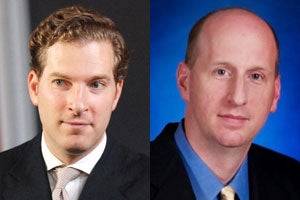In Christian Legal Society v. Martinez, the Supreme Court ruled 5-to-4 last June that a public law school did not violate the First Amendment by withdrawing recognition from a Christian student group that excluded gay students. On Sept. 8, the Harvard Federalist Society sponsored a discussion of Martinez and its implications for religious freedom.
The HLS panel on the case brought together David French ’94, who served as co-counsel to the student group, the Christian Legal Society, and HLS Professor Noah Feldman, an expert on the establishment clause, in a discussion moderated by Professor Charles Fried.
Writing for the majority in the case, Justice Ruth Bader Ginsburg ’56-’58 said the justifications the Hastings College of Law had offered for the policy overcame any First Amendment concerns of the Christian student group. The Court held that it was constitutionally permissible for an institution of higher education to require student groups to accept all students who wished to participate. The case was remanded to the 9th Circuit to decide whether the school applied the all-comers-policy evenly across all student groups.
French described the Court’s holdings in the case as narrow but troubling. Within the world of public education, he said, it has already “led to mass confusion.” More broadly, he believes the ruling is deeply ominous for religious groups. He explained that CLS, like many religious student groups, didn’t limit membership according to sexual orientation but according to how individuals choose to act on that orientation. This is in keeping with Christian doctrine that recognizes that we are all fallen beings, he said; if we can’t control our desires, we can at least control our conduct.
But Justice Ginsburg, French said, “went out of her way to conflate status and conduct,” holding that CLS was engaged in sexual orientation discrimination by upholding a standard that said sex was allowed only within the confines of marriage. “This was a shockwave in the religious community,” according to French, and there is now fear, he said, that the state will be able to condition the provision of all sorts of benefits “on a reading of sexual orientation and non-discrimination law that cuts at the heart of orthodox Christian theology.”
Feldman spoke about precedents to Martinez, in particular a case that changed the terrain for religious freedom litigation. In Rosenberger v. University of Virginia, the Supreme Court held that it was a violation of free speech to deny funding to a state university’s religious publication, rather than an establishment clause violation to provide such funding. That ruling, he said, represented a sea change. But in Martinez, said Feldman, the Court drew a line and backed away from the implication of that position.
Why did the Court draw this line? In part, Feldman said, because of “a bizarre element of the doctrine” that treats public universities as state actors. Feldman called that “crazy.” In reality, he said, public universities operate very much like private universities, except that they are constrained by constitutional doctrines that bind the states.
Feldman also attributed the Court’s decision to the transformation underway in the views of Justice Anthony Kennedy ’61, a “Reagan appointee who has emerged as the most influential liberal Supreme Court justice of the last 20 years” mostly because of his decisions in gay rights cases. In these cases, said Feldman, he has located himself on the “liberal side of the divide.” Feldman added that he believes that on this issue, Kennedy is “on the right side of history,” and that, as his vote in this case indicates, he wants to stay there.
